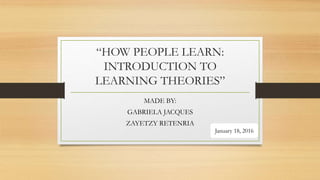
How people learn
- 1. “HOW PEOPLE LEARN: INTRODUCTION TO LEARNING THEORIES” MADE BY: GABRIELA JACQUES ZAYETZY RETENRIA January 18, 2016
- 2. PHILOSOPHY-BASED LEARNING THEORY • People have been trying to understand learning for over 2000 years. • Learning theorists have carried out a debate on how people learn that began at least as far back as the Greek philosophers, Socrates, Plato and Aristotle. • To a substantial extent, the most effective strategies for learning depend on what kind of learning is desired and toward what ends.
- 3. PSYCHOLOGY-BPSYCHOLOGY-BASED LEARNING THEORYASED • The nineteenth century brought about the scientific study of learning. • Psychologists began conducting objective tests to study how people learn, and to discover the best approach to teaching. • Jean Piaget (1896 – 1980) was the first to state that learning is a developmental cognitive process, that students create knowledge rather than receive knowledge from the teacher.
- 4. PROGRESSIVE LEARNING THEORY John Dewey (1859 – 1952) agreed in part with Rousseau that education should not be separate from life itself, that education should be child-centered, guided by a well trained teacher who is grounded in pedagogical and subject knowledge. Dewey believed that the ability of a person to learn was dependent on many things, one of which was the environment.
- 5. THE LEARNING PROCESS “Inside the Learning Classroom: Theory into Practice” presents a body of learning theory for classroom teachers to use to support their students’ learning’’.
- 6. THE BRAIN PLAYS A ROLE Psychologists have observed that individuals do progress through a predictable series of stages in their cognitive development. Learning changes the physical structure of the brain through the process of continuous interactions between the learner and the external environment.
- 7. THE LEARNING ENVIRONMENT MAKES A DIFFERENCE People learn by making sense of the environment and of stimuli around them. Reinforcements from the environment and the nature of feedback from significant others can stimulate or undermine greater effort.
- 8. LEARNING IS BASED ON ASSOCIATIONS Learning is a process of drawing connections between what is already known or understood and new information.
- 9. LEARNING OCCURS IN CULTURAL AND SOCIAL CONTEXTS Culture influences the knowledge and experiences people bring to the classroom, the ways in which they communicate, the expectations that have for how learning will occur, and the ideas they have about what is worth learning.
- 10. PEOPLE LEARN IN DIFFERENT WAYS Identifying individual differences among learners can help us to better understand and guide the learning process. People can be seen as possessing a number of intelligences beyond the linguistic and logical-mathematical abilities typically emphasized in schools. Learners have processing differences that influence how they handle visual, aural, or kinesthetic information.
- 11. PEOPLE THINK ABOUT THEIR OWN LEARNING, AND THEIR FEELINGS MATTER The thoughts and emotions shape the learning process. Metacognitive skills are able to think and control one's own thinking and enable students to manage their learning process, difficult to learn new concepts, and to solve problems effectively. Positive emotions are feelings of trust and willingness to make an effort. Help students think is very important, as it helps them to learn new tasks and process knowledge.
- 12. TEACHING IS A PROCESS OF ORGANIZING THE ENVIRONMENT Teachers can develop learning activities with real purposes, audiences, and activity structures that mirror those outside of school settings. By encouraging discourse among students about ideas, concepts, and relationships they can create environments where the teacher is not the only source of knowledge.
- 13. TEACHING IS A PROCESS OF ORGANIZING KNOWLEDGE, INFORMATION, AND ACTIVITIES Teachers can develop learning activities with real purposes, audiences, and activity structures that mirror those outside of school settings. By encouraging discourse among students about ideas, concepts, and relationships they can create environments where the teacher is not the only source of knowledge. Teachers can also organize reflection on activity and analysis of ideas and products that enables learners to transform activity into broader understandings.
- 14. TEACHING IS A PROCESS OF ORGANIZING PEOPLE Teachers can create a sense of community within their classrooms by developing clear norms for behavior, creating an emotionally safe environment, encouraging collaborative learning, and having students teach students. This includes identifying roles for students as they interact with one another in group tasks, pairs, and other arrangements, fostering student discourse, and managing the complexities of multiple ongoing tasks and activities.
- 15. THE RELATION OF THEORY TO PRACTICE The challenge of teaching can be seen as building bridges between built in the matter, on the one hand, knowledge and minds and motives students, on the other hand. In the territory of the theory and practice both perspectives are needed, but none of them can be enough by themselves.
- 16. DEFINITION OF A THEORY A theory is a way of thinking and a model of how things work, how principles are related, and what causes things to work together. Theory is not just an idea. It’s an idea that is a coherent explanation of a set of relationships that has been tested with lots of research. If the idea survives rigorous testing, that theory is said to have empirical grounding.
- 17. APPLYING THEORY TO PRACTICE Teachers need to recognize individual differences of each student and build on previous knowledge, language students, and cultures. The teacher's role is to build a bridge from where students begin to curriculum, schools and Visualize future goals they would like to achieve.
- 18. THE TEACHER IS ALSO A THEORIST The teacher has to do his or her own research as well. Good teachers have a kind of “personal practical knowledge” that enables them to understand what’s going on with their students. By watching students, observing them in action, examining their work, and talking and listening to them, teachers learn about what makes their students “tick” as learners.